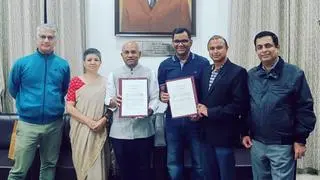Last week, when I was in Colombo, I happened to meet an ex-colleague of mine. After the usual pleasantries, he asked me, “What are you up to these days?” I told him that I am a consultant. He started laughing and said, “Do not get me wrong. A consultant is someone who will look at your watch and tell you the time.” I did not know how to react.
On my way back to India on the flight, I pondered over his comment.
Why is there mistrust in the minds of people when they see a consultant? May be some consultant has misused his position to make some fast bucks. I am not saying that all consultants are like that but this must have surely happened somewhere.
Consulting is a highly sought-after job at B-schools. Data reveals that B-schools are a favoured hunting ground for the top-notch consulting firms namely McKinsey, Boston Consulting Group (BCG), Booz Allen Hamilton, Accenture, Ernst & Young, KPMG and the like.
In a layman’s language, a consultant is someone who is an expert in his field, and has the ability to have a deeper understanding of ones problems and is able to recommend a solution for it.
To illustrate with an analogy what exactly a consultant does, or how exactly he works, I draw similarities with a travel agent. I go to a travel agent and ask him to book an air ticket from Delhi to London.
Differentiation In this case he is a service provider and not a consultant. The same travel agent will act as a consultant if I go to him and say that I want to plan a holiday.
He looks at the possible destinations in the given time span researches on hotels, looks at possible itineraries and finally comes with some options with a recommended approach.
The consultant’s job is akin to this. I have seen many of the IT folks claiming themselves as consultants. While some of them are, but majority of them are service providers and good executioners and do what the client asks them to do.
In the true sense, instead of doing what they are asked to do, good consultants actually have a proactive approach in suggesting to the client on how they can improve their processes and reduce the total cost of ownership.
With consultancy comes responsibility. A good consultant should be responsible and accountable for his actions and should never try to suggest something to make a quick buck.
You can make some quick money but you lose respect and trust which are very important for a consultant. A good consultant is expected to deliver results in the time allocated to him. If that means putting in extra effort for preparedness, he needs to do it.
He needs to come up with options and their pros and cons. A good consultant will recommend an approach but should not dictate one as this has the potential to cause a suspicion in the client’s mind.
But the question still remains why will a consulting firm hire from a B-school?
Why B-schools? It is true that most of the consulting firms harp on the collective experience of their consultants but the nature of a B-school education in terms of a holistic approach definitely gives graduates from here an edge.
And to add to that, the very nature of the assignments which we undertake at B-school where you do not have an idea of the subject and then you go through the motions to master it and finally come up with a solution gives a lot of confidence to the hiring consulting firms.
Aside from this, the ability to communicate effectively, write timely reports, maintaining attention to details and the ability to make presentations at the drop of a hat, are skills universal to B-school graduates and are coveted in the job market. What I have talked about is an indicative list and not an exhaustive one.
( Sandeep Chatterjee is an alumnus of IIM Kozhikode, Class of 2003, and is a Solution Architect with Oracle ).






Comments
Comments have to be in English, and in full sentences. They cannot be abusive or personal. Please abide by our community guidelines for posting your comments.
We have migrated to a new commenting platform. If you are already a registered user of TheHindu Businessline and logged in, you may continue to engage with our articles. If you do not have an account please register and login to post comments. Users can access their older comments by logging into their accounts on Vuukle.